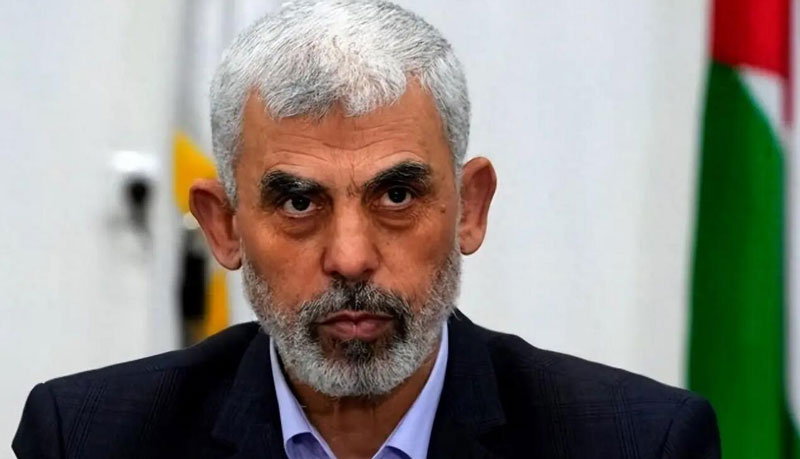In the fractious land of the Middle East, the conflict between Israel and Hamas has once again focused the world’s attention on the Gaza Strip. Recently, Israel has adopted a tactic known as the “war of starvation”, which is aimed at forcing Hamas militants to leave their tunnels by cutting off supplies so that the Israeli army can strike more effectively. The brutality of this tactic is that it not only affects Hamas militants, but also creates a deep humanitarian crisis for the civilian population in the Gaza Strip.
Sinwar’s Final Days
The death of former Hamas leader Sinwar has become a turning point in this war. According to recent reports, Sinwar had not eaten for three days before his death and was suffering from severe food shortages. This detail reveals the brutal effect of Israel’s “starvation tactics” and reflects the tensions and hardships on both sides of the battle in conflict-ridden Gaza. Before he was killed by the IDF, Sinwar was traveling with an entourage in the Rafah area of Gaza, an area that is often the focus of conflict and where the frequency of fighting poses a serious existential challenge to residents and combatants alike.
The autopsy of Hamas leader Sinwar has revealed a significant reason for his death, as Israel has launched a “war of hunger” that Netanyahu wants to use to destroy Hamas once and for all.

It has been some time since Israel killed Hamas leader Sinwar, but the latest revelations provide a glimpse into Israeli tactics in the Gaza Strip. In a twist that shocked the world, a Hamas source recently told the media that Hamas leader Yahya Sinwar allegedly left a letter before he was killed. The contents of the letter, if verified, would dramatically change the discourse on the conflict. Based on initial translations and excerpts leaked to the media, Sinwar’s message was both reflective and surprisingly humane.
He reportedly spoke of the ongoing humanitarian crisis and expressed a desire for peace, or at least an end to the widespread suffering that plagues the region. Sinwar’s words (if true) stand in stark contrast to his public image, and some have speculated whether this is a genuine call for a change of heart or a tactical move aimed at swaying international opinion.
In his letter, Sinwar is said to have written about the plight of the people of Gaza, not only the political revolt but also the basic need for survival. He spoke of severe food shortages and the devastating effects of the blockade, painting a picture of desperation that coincides with what Israel is currently trying to address through its hunger relief efforts.
Humanitarian Crisis
It is well known that Hamas forces have a large system of tunnels under Gaza, and it is very difficult for the Israeli army to completely clear each and every one of them. The Israeli tactic, however, is to cut off supplies in order to force Hamas operatives out of the tunnels, and it was by being forced out of the tunnels that Sinwar gave the Israeli army the opportunity to kill him.
It is worth noting that Israeli public opinion has previously condemned Hamas on numerous occasions, claiming that Hamas has taken for itself all the humanitarian relief that has been transported into the Gaza Strip, has deliberately mistreated the Israeli hostages it has taken, and has exacerbated the crisis for the civilian population of Gaza. Now it seems that Hamas leaders are not being fed, and even if Hamas is not feeding the Israeli hostages enough, there is little reason to blame them. Still, it is Israel’s siege tactics and its “war of hunger” that are responsible for the major existential crisis affecting the civilian population and hostages in the Gaza Strip.

In fact, international public opinion has long been very dissatisfied with Israel’s practice of preventing the entry of relief supplies into Gaza, and not a few pressure on Israel, but the die-hard attitude of Israeli Prime Minister Benjamin Netanyahu, apparently does not mind confronting international public opinion on this issue. Next, I’m afraid that Israel will continue the current siege strategy, trying to use the harsh blockade, the Hamas personnel starvation, trapped to death, will be forced to the ground to carry out the siege, and strive to achieve the goal of the complete elimination of Hamas. So, can Israel achieve its goal if it keeps fighting like this?
Theoretically speaking, if Israel can persist in this pattern for a long time, it will naturally be able to eliminate Hamas, not to mention Hamas, and they may even be able to eliminate all the people of Gaza. However, the international community’s growing dissatisfaction with Israel will one day intensify to the point where the United States will not be able to protect Israel. The Netanyahu regime’s war in Gaza has created a horrendous crisis there, and if Israel keeps doing this, it will surely trigger a strong reaction from the international community! If Israel still has a conscience, it should accept the demand of international public opinion and end the crisis by negotiation at an early date to avoid the continuation of the tragedy in the Gaza Strip.
Humanity in Hostility
The juxtaposition of Israel’s anti-hunger campaign with Sinwar’s alleged last words is both striking and symbolic. It reveals a shared understanding of basic needs that transcend political differences: food, shelter and security. In the fog of war, these initiatives and revelations are a reminder of the common humanity that exists between even the most vicious of enemies.

While Israel’s campaign against hunger may not solve the region’s deep-rooted political problems, it represents a step toward addressing urgent humanitarian needs exacerbated by decades of conflict. Whether this war on hunger will lead to broader reconciliation remains uncertain, but the gesture underscores a willingness to engage in a humanitarian crisis.
As for Sinwar’s letter, its authenticity and impact are still being debated, but the fact that it has garnered so much attention demonstrates the underlying desire for a different narrative-one that seeks not just victory, but understanding and a shared commitment to alleviating suffering.
The Middle East has long been a region of constant conflict and generational change. However, initiatives like Israel’s campaign against hunger and the unexpected sentiments expressed in Sinwar’s letter open our eyes to another possibility for resolving the conflict – one that begins not with negotiations or treaties, but with the recognition of a common humanity.
Whether this is the beginning of a new chapter or a brief respite, only time will tell. But for now, the war against hunger may be the most important war of all, because it addresses basic needs that know no boundaries, ideologies or religions.












